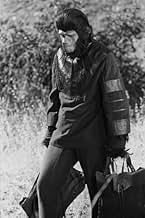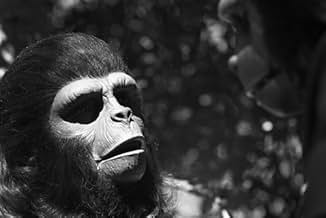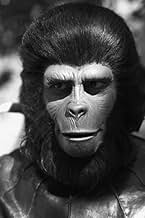AVALIAÇÃO DA IMDb
7,0/10
5,9 mil
SUA AVALIAÇÃO
Dois astronautas e um amigo chimpanzé simpático são fugitivos em uma Terra futura dominada por uma civilização de macacos humanoides.Dois astronautas e um amigo chimpanzé simpático são fugitivos em uma Terra futura dominada por uma civilização de macacos humanoides.Dois astronautas e um amigo chimpanzé simpático são fugitivos em uma Terra futura dominada por uma civilização de macacos humanoides.
Explorar episódios
Avaliações em destaque
The television series of The Planet Of The Apes is not as good as the films, but is still worth a watch.It lacks the originality of the films. The series is set 893 years before the original film and it seems that in this time humans can talk, this means that over the next 893 years humans lose the power of speech and become more wild. One thing i did notice, though, is that dogs are alive...Now this is impossible considering the movie fact that dogs(along with cats) died out, thus opening up the way for apes to become pets, and eventually servants, and soon became intelligent like humans.This series of Planet Of The Apes was released on video in two limited edition box sets in Australia. I now own all five films and all thirteen episodes on video.I am now eagerly awaiting the release of Return To The Planet Of The Apes (the animated series) on video. I am also looking for the Behind The Scenes Video about the films.
PLANET OF THE APES was a show that stressed dialouge over brawn; Talk over heft and firepower. The tv show was big on words and had some good art direction yet alas, only lasted 14 episodes. The series featured creative people who worked on STAR TREK and had a quality to it seen prominently in the episode about the prison fishermen. The show at times had a flair of genius in production values and props. PLANET OF THE APES was a genre show in a era before big syndicated sci fi had found a market (except SPACE 1999). The series as a whole was not bad but it was not all it could have been either. There were questions raised in the films left unexplored that could have been delved into by the series. I recommend the DVD set to serious fans.
The Planet of the Apes movies interested me very much as a young child. I was (and still am) very into the monster/sci-fi genre.
When this series came out, my friends and I would always be tuned in. In the special "Behind the Planet of the Apes" it references this series as being 13 shows long. It also mentions that the show was up against 2 very popular TV sitcoms at the time, Sanford & Son and Chico & the Man. I wasn't a fan of either of these other shows so I guess I was in the minority in watching "Apes".
I remember commenting back around that time that the Planet of the Apes TV series looked like Starsky and Hutch vs the apes and I still feel that way when I see clips of the old ape TV show. The 2 human stars bear an uncanny resemblance to the 2 stars of the popular 70s TV cop show (which came out in 1975). There was much merchandising back then, and we collected ape trading cards and ape dolls. I also had the ape model kits. I remember getting a few of the dolls for Christmas but the "ape house" set that came with it was too expensive and a neighbor kid had got that so we 'combined' the items for play.
In 1981 the ape TV shows were combined and renamed "Return to the Planet of the Apes" among other titles.
When this series came out, my friends and I would always be tuned in. In the special "Behind the Planet of the Apes" it references this series as being 13 shows long. It also mentions that the show was up against 2 very popular TV sitcoms at the time, Sanford & Son and Chico & the Man. I wasn't a fan of either of these other shows so I guess I was in the minority in watching "Apes".
I remember commenting back around that time that the Planet of the Apes TV series looked like Starsky and Hutch vs the apes and I still feel that way when I see clips of the old ape TV show. The 2 human stars bear an uncanny resemblance to the 2 stars of the popular 70s TV cop show (which came out in 1975). There was much merchandising back then, and we collected ape trading cards and ape dolls. I also had the ape model kits. I remember getting a few of the dolls for Christmas but the "ape house" set that came with it was too expensive and a neighbor kid had got that so we 'combined' the items for play.
In 1981 the ape TV shows were combined and renamed "Return to the Planet of the Apes" among other titles.
I have just returned from the Chiller Theatre Convention in NJ (April 25, 2004), where my children and I met in person with Ron Harper who played Alan Virdon in the "Planet of the Apes" television series. We encountered a genuinely "good guy", much like the noble character he played on the "Planet of the Apes" television series. The meeting made a favorable impression upon my children -- Mr. Harper's autograph is already framed and hanging on their wall.
I enjoyed the "Planet of the Apes" television series as a child when it first aired in 1974, so I was intrigued to watch it again on DVD with my children. After watching the DVDs, I can report that I still enjoy the show. It is a shame that the series only ran for 14 episodes. Perhaps if Galen, Burke, and Virdon had been renewed for another season, the story lines would have broken-free from "The Fugitive"-type theme that dominated its (much too short) run? Even so, some of the episodes were of high quality, and, in my opinion, were actually as good as (if not better than) my two least favorite of the full-length "Planet of The Apes" motion pictures: "Escape from the Planet of the Apes" and "Battle for the Planet of the Apes". In particular, the episodes of the television series which took place within devastated city ruins standout in my mind as quite excellent television productions. I suggest that a single "Best of" DVD be released containing four of the better episodes for those fans who will find the $40 to $50 price tag for the Complete Series too steep.
Some have questioned the logical inconsistencies in the television series. They note that some things that happen in the television series contradict things that happened in the films. One problem with their arguments -- with the introduction of time travel, the notion that history can be altered repeatedly by those who travel through time is introduced. Thus, the appearance of a dog in 3085 (the year depicted in the television series) does not contradict the claim made in "Conquest of the Planet of the Apes" that all cats and dogs were killed-off in the late-20th Century. Theoretically, a future time traveler might have traveled back in time and caused an event that saved dogs from annihilation. Also, it is conceivable that dogs were re-introduced into society somewhere between the late-20th Century and 3085, as scientific advancements in genetics made it possible. So, there is little merit to the argument that some events depicted in the television series don't jibe with events depicted in the films.
I feel that this television series very competently portrayed a believable ape-dominated world of the future. I recommend this box set, but with a caveat -- take your time getting through the 14 episodes, as the underlying "fugitive-on-the-run" theme can get monotonous if you watch all the episodes one-after-another.
I enjoyed the "Planet of the Apes" television series as a child when it first aired in 1974, so I was intrigued to watch it again on DVD with my children. After watching the DVDs, I can report that I still enjoy the show. It is a shame that the series only ran for 14 episodes. Perhaps if Galen, Burke, and Virdon had been renewed for another season, the story lines would have broken-free from "The Fugitive"-type theme that dominated its (much too short) run? Even so, some of the episodes were of high quality, and, in my opinion, were actually as good as (if not better than) my two least favorite of the full-length "Planet of The Apes" motion pictures: "Escape from the Planet of the Apes" and "Battle for the Planet of the Apes". In particular, the episodes of the television series which took place within devastated city ruins standout in my mind as quite excellent television productions. I suggest that a single "Best of" DVD be released containing four of the better episodes for those fans who will find the $40 to $50 price tag for the Complete Series too steep.
Some have questioned the logical inconsistencies in the television series. They note that some things that happen in the television series contradict things that happened in the films. One problem with their arguments -- with the introduction of time travel, the notion that history can be altered repeatedly by those who travel through time is introduced. Thus, the appearance of a dog in 3085 (the year depicted in the television series) does not contradict the claim made in "Conquest of the Planet of the Apes" that all cats and dogs were killed-off in the late-20th Century. Theoretically, a future time traveler might have traveled back in time and caused an event that saved dogs from annihilation. Also, it is conceivable that dogs were re-introduced into society somewhere between the late-20th Century and 3085, as scientific advancements in genetics made it possible. So, there is little merit to the argument that some events depicted in the television series don't jibe with events depicted in the films.
I feel that this television series very competently portrayed a believable ape-dominated world of the future. I recommend this box set, but with a caveat -- take your time getting through the 14 episodes, as the underlying "fugitive-on-the-run" theme can get monotonous if you watch all the episodes one-after-another.
The Planet of the Apes TV series is often unfairly criticised (as are the four film sequels) for falling far short of the epoch-making original movie.
However, there is much to be enjoyed for PotA devotees and the less committed alike. The three leading characters of Galen, Virdon and Burke are all instantly likeable and well acted, Mark Lenard is superb as their pursuer Urko, who is second as a Gorilla commander only to James Gregory's peerless performance as Ursus in "Beneath") and Booth Colman evokes Maurice Evans as Zauis (although this Zauis cannot be the same ape as played by Evans in the first two films). Many fine and memorable guest roles throughout and interesting - if slightly repetitive - storylines add up to a satisfying series.
The only downside is the somewhat corny dialogue - especially certain lines spoken by Burke - which rob a number of scenes of their effectiveness.
However, there is much to be enjoyed for PotA devotees and the less committed alike. The three leading characters of Galen, Virdon and Burke are all instantly likeable and well acted, Mark Lenard is superb as their pursuer Urko, who is second as a Gorilla commander only to James Gregory's peerless performance as Ursus in "Beneath") and Booth Colman evokes Maurice Evans as Zauis (although this Zauis cannot be the same ape as played by Evans in the first two films). Many fine and memorable guest roles throughout and interesting - if slightly repetitive - storylines add up to a satisfying series.
The only downside is the somewhat corny dialogue - especially certain lines spoken by Burke - which rob a number of scenes of their effectiveness.
Você sabia?
- CuriosidadesThough uncredited, Rod Serling wrote the original treatment and two proposed scripts for this series, essentially creating the basic format followed by the program, two astronauts and one chimpanzee pursued by the Apes civilization. However, his storyline involving the magnetic disc ended up being dropped by the show's writers, putting an end to the series' only story arc.
- Erros de gravaçãoIn many of the interior close-up shots, the actors' own teeth are visible behind the teeth of their ape masks.
- Versões alternativasIn 1981, selected episodes were re-edited into five made for TV movies: Back to the Planet of the Apes (1981) Forgotten City of the Planet of the Apes (1981) Treachery and Greed on the Planet of the Apes (1981) Life, Liberty and the Pursuit of the Planet of the Apes (1981) Farewell to the Planet of the Apes (1981). One episode, "The Liberator," was not aired during the original network run, but was aired in the UK and made its US debut in the 1990s.
- ConexõesFeatured in Behind the Planet of the Apes (1998)
Principais escolhas
Faça login para avaliar e ver a lista de recomendações personalizadas
- How many seasons does Planet of the Apes have?Fornecido pela Alexa
Detalhes
- Data de lançamento
- País de origem
- Central de atendimento oficial
- Idioma
- Também conhecido como
- Planet of the Apes
- Locações de filme
- Empresa de produção
- Consulte mais créditos da empresa na IMDbPro
- Tempo de duração47 minutos
- Cor
- Proporção
- 4:3
Contribua para esta página
Sugerir uma alteração ou adicionar conteúdo ausente

Principal brecha
By what name was Planeta dos Macacos (1974) officially released in India in English?
Responda

































